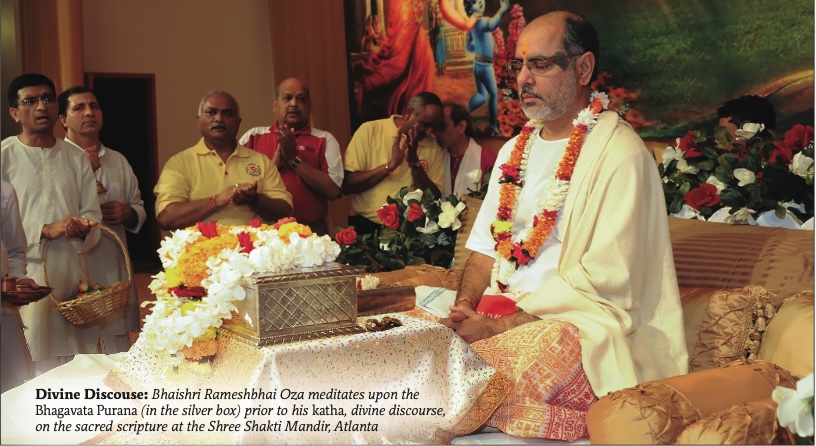BY PUNIT PATEL
This interview was conducted in July of 2010 in Atlanta, Georgia, during Bhaishri Rameshbhai Oza’s presentation (katha) of Bhagavat Purana, the ancient text recounting the life of Lord Krishna.
Punit Patel: Is it a limitation that Bhagavat is in Sanskrit, as we are then dependent upon a learned preacher to understand it?
Bhaishri: Sanskrit is the language of the Gods. It is not a dead language but the divine language of the cultured. We must first understand this. Whenever any text is translated, a portion of the original essence is lost. Bhagavat has been called the physical form of Lord Krishna. Therefore, as with all forms of Krishna, every piece must remain in its correct place. Yes, the fact that a preacher is needed to explain the Sanskrit verses is a limitation; but that becomes a strength as well, because it forces people to go deeper into the text to understand the hidden essence. It is a blessing in disguise, which brings you into the company of saints.
Punit: I have heard the Bhagavat at least 17 times in the last year, but I still feel I must hear more. How to explain this addiction?
Bhaishri: Every time one hears the Bhagavat, a new meaning can be found in every verse or episode. It is never out of date. Fasting, penance and katha are all done in an effort to develop love for God, the main aim of the human body. For example, a man is sent from India to the United States for a business trip. Now, if that man never really attends the necessary meetings and just tours the nation, then his boss will get upset when he returns to India. The man lacked love for the goal, which was progress of the company, just like many people forget their goal of realizing God. Lacking love for this goal, they get caught up in worldly matters and are unable to achieve it.
Punit: Ahalya, Sita, Draupadi, Mandodari and Tara are considered the five satis, all of whom had to deal with grave sorrows in life. Are the ideal Hindu women always the ones who take on sorrow?
Bhaishri: Yes, sati is the ideal woman in Hinduism. But a woman is called a sati not because of the amount of sorrow she undergoes—rather, how she handles her life when such sorrow occurs. There are sorrows in everyone’s life. The key is how you react during those times. It should be with peace, patience and siding with truth. Thus, sorrows are not a requirement, but how we live in sorrow is the message.
Punit: Some Hindus say that abortion is a result of the fetus’ karma and fate. Others say that the act is a definite sin and bad karma for the parents.
Bhaishri: It is the Hindu belief that from the moment of conception, a life has made its home in the mother’s womb, and an abortion is disturbing this natural process. Hinduism is not a rigid religion. It is very flexible and moves according to the principle of truth. Abortion treats life like a commodity. The life is not seen as valuable entity in itself, but a possession whose fate is in the owner’s hands. In India, desire for a son has led to an increase in abortions of female fetuses. Abortion, when driven by selfish reasons, is nothing more than viewing life as a commodity.
Punit Patel (punitanilpatel@yahoo.com), 25, is pursuing a PhD in Healthcare Ethics at Saint Louis University.


